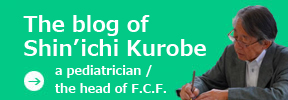“Voices from mothers”
We have become healthy both physically and mentally, and I have realized the splendor of Kumi-no-sato. I felt as if I gradually got out of my shell which I had shut myself up in since the Fukushima nuclear incident. Kumi-no-sato is a sacred place of healing. I now realize that we are so lucky to receive loving kindness from everyone.
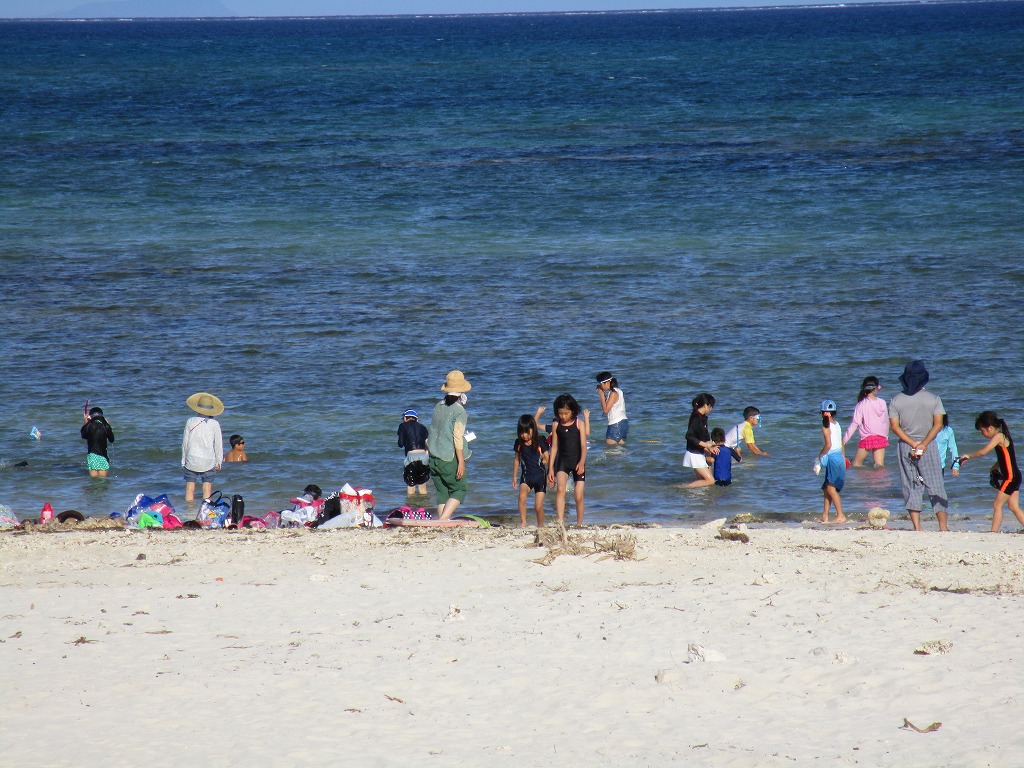
In Fukushima prefecture, people under the age of 18 started receiving medical care for free, the development of hospitals and inpatient facilities is underway after the nuclear power incident. Even more important than that, I am convinced in order to protect the children from diseases, facilities such as Kumi-no-Sato are necessary.
Since the nuclear power incident, I live in constant fear and I feel that I cannot overcome such fear. Last year my children often fell ill as well; my eldest son has recently complained about chest pain. I am concerned about the influence of long-term low-dose exposure on the children’s health. We took part in this activity because I wanted to allow my children to maintain their health, away from contaminated areas.

Warm climate, blue sky, the beautiful sea — my heart was uplifted from the moment of our arrival at Kumejima Airport. I was impressed so much by the welcoming faces of volunteer workers. Great people got together for us and we were treated very well.
During our days in Kumi-no-Sato, mothers from the area prepared our meals with love and care, helping us to feel that we were getting better. The children happily played outside, taking walks, picking up stones and leaves, and they ran barefoot in the grass; we mothers were happy to hang laundry outside. I felt more than ever the gratitude of having clean air, earth and water. What bliss to watch the children play with joy! It was a happy time.

At Kumi-no-sato Mr. Hirokawa, a photo journalist/the founder of this initiative, talked to us about episodes based on his experiences. His story eerily rang exactly true in my mind. I was moved by his strength of dedication, trying to “protect children”. I felt that sharing the truth and accepting the truth is important.
At the thyroid screening during our stay, I was at first told for my own part that my thyroid was perfect. Then my 3-year-old and 6-year-old sons were diagnosed with many cysts.” I unwillingly acknowledged it as true, being painfully aware of the harshness of reality.
One day I was asked by my second son “Am I going to die soon?”
It is not just a matter of thyroid problem; there are various concerns and health hazards.
I want to leave Fukushima if possible, but my husband has no intention of ending his business that he inherited from his grandfather. If it comes to evacuation, it will be only the children and me. I cannot decide to leave because it would tear my family apart. I have often asked myself if it is really safe for us to keep living in Fukushima Pref. though.
Already I feel as if Kumi-no-sato is a second home for us. I would like to thank the people of Kumejima for their generosity and hospitality. We hope a lot of children from Fukushima can visit Kumi-no-Sato and become healthy in those lovely surroundings. We would like to ideally visit once every six months to maintain our health.
We need the continued support of everyone and even more people in the future. I hope you will cooperate with us and support us. I am thinking of starting a fundraising campaign of my own. Without having to sacrifice our children’s bright futures, I want to be creative in the process of doing this. Thank you very much.
Abe Emi (Iwaki City, Fukushima Pref.)
We’d at least like to take our kids to recuperate regularly
I can’t thank you enough for your hospitality. I was able to take my children who have been having health problems such as asthma since last year to recuperate, and I would like to thank those who supported us.
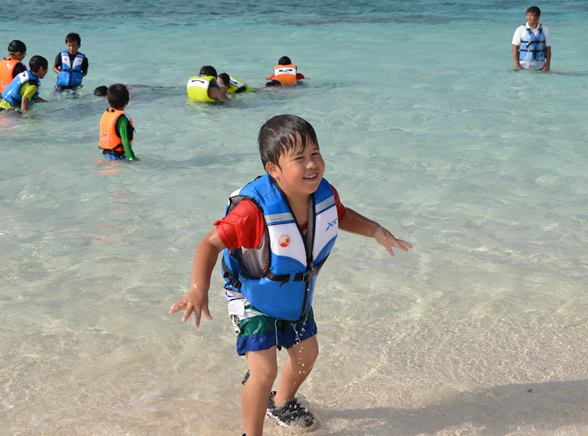
In an environment where we didn’t have to worry about playing, touching, and eating, we never imagined being so happy in our ordinary lives.
It’s been more than a month since we came back from Kumi-no-sato. Now in Fukushima Pref., I go out with a Geiger counter (dosimeter) in my hand and check where the food comes from. I was getting used to it, but then remembered that it’s not normal to live this way.
In Iwaki City where I live, there are the mountains and the sea. We used to go on a picnic in spring, swimming in the sea and the river and catching insects in summer, gathering acorns/chestnuts and harvesting potatoes in fall…, but because of the nuclear incident, we can’t do that anymore. Every spring, we used to look forward to harvesting strawberries and bamboo shoots in our garden. However, nowadays we should limit the time with a portable Geiger counter in hand even when playing in the park.
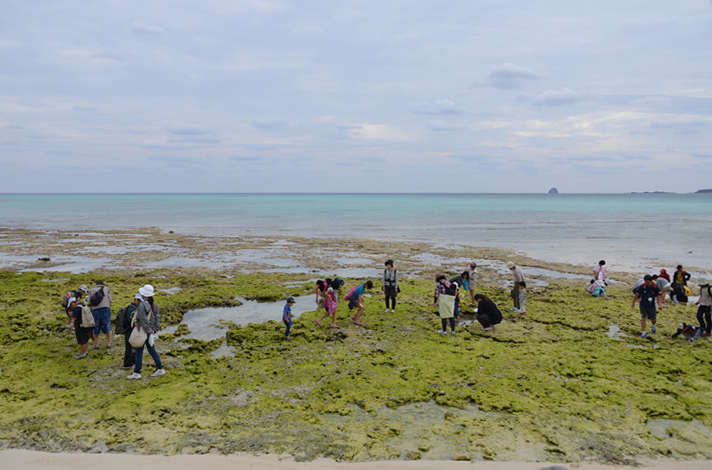
In Kumejima, we spent time outdoors, without checking the clock from morning until evening, swimming in the sea, lying in the grass, and touching all manner of living things. The children were all so happy throughout our stay there, and I felt so satisfied to raise my kids in nature.
I am glad to have met and talked to the volunteer workers of Kumi-no-sato, as well as the mothers from Fukushima, whom I still keep in touch with. In particular, the meeting with Mr. Hirokawa was very important to learn the facts. Hardly ever has the truth been revealed neither on TV nor in the newspapers, and I wasn’t sure how much to believe on the internet. But after talking to Mr. Hirokawa, I felt more at ease with myself.
I often think of seeking refuge somewhere. If we were to evacuate, it would be for 15 years until our kids turn 20. Families who are split and living in two different places may have difficult lives. Then, with my husband, starting a new life in a new place may involve some big risks. Most probably we both would have to work to make ends meet. In an area with no relatives close by, we are not sure if we can both keep working. For many different reasons, there are many families who can’t leave Fukushima. For those reasons, we would at least like to take our kids to recuperate regularly.
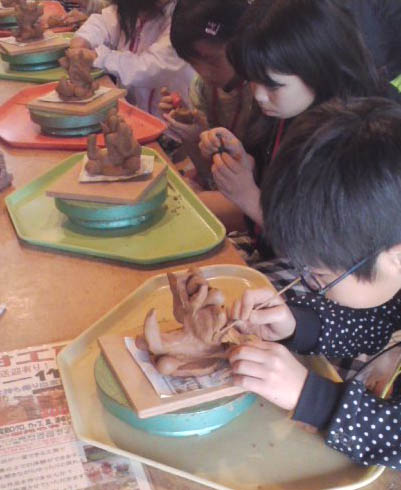
I am worried that the nuclear incident in Fukushima will be forgotten. But I get encouraged from people all over Japan who support and think of Fukushima’s children. I strongly wish more and more people will look at this problem.
K. H. (Iwaki City, Fukushima Pref.)

